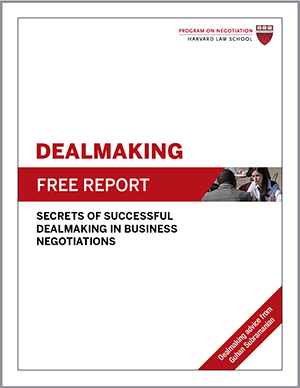
The clearest method for achieving exclusivity in negotiation is an exclusive negotiation period during which both sides agree not to talk to third parties, even if approached unexpectedly by others. In some arenas, these terms are called no-talk periods.
An exclusive negotiation period can facilitate deals in several different ways. First, it allows both sides to signal that they believe a zone of possible agreement, or ZOPA, exists; otherwise, they wouldn’t waste their time by agreeing to negotiate exclusively. This signal can help build the trust that parties need to explore joint gains. For example, when NBC and Paramount Television agreed to a 30-day exclusive negotiation period to take place in 2001 for the renewal of the hit show Frasier, the two sides implicitly acknowledged that there was no better home for the show than NBC.
Second, an exclusive negotiating period worsens both sides’ best alternatives to a negotiated agreement, or BATNA, since both parties are “locked out” from talking to others in the event of an impasse.
The magnitude of this effect depends on the length of the decided exclusivity period. A one-year lockout, common in the world of mergers and acquisitions (M&As), harms BATNAs much more than the 30-day lockout typical of many commercial settings. Of course, in most negotiation situations, your ultimate goal is to improve your BATNA, but not worsen it, in order to increase your overall bargaining power.
In this case, however, both sides are worsening their BATNAs in roughly equal ways. If neither party is making a significantly greater sacrifice of walkaway alternatives, then agreeing to an exclusive negotiation period should have little effect on relative bargaining power or the final outcome of the deal.
Third, an exclusivity period sets a clear deadline for negotiations. As such, it forces one or both parties to put their best and final offer on the table before the exclusivity period runs out. In effect, an exclusive negotiation period is the dealmaking equivalent of the “courthouse steps” bargaining that often produces a last-minute settlement in the litigation environment.
While these factors increase the likelihood of a deal, exclusive negotiating periods have their drawbacks. Exclusivity is quite valuable for the buyer with few options but correspondingly costly to the seller who has many alternatives. As the seller in this instance, you should make sure you’ve fully exploited the benefits of nonexclusivity – negotiating with multiple parties and playing them off one another, for example – before committing to exclusive negotiations.
In the bidding contest for Vivendi Universal Entertainment in 2003, seller Vivendi negotiated exclusively with General Electric only after General Electric survived three rounds of bidding and indicated that it was willing to pay more than the other remaining bidder. By opening with an auction, Vivendi ensured that its exclusive negotiations would be with the highest bidder.
What do you think about extended negotiations? Share your thoughts with our readers in the comments section below.
Adapted from “Hands Off! Negotiating Exclusivity” by Guhan Subramanian in the October 2005 issue of the Negotiation Briefings newsletter.




